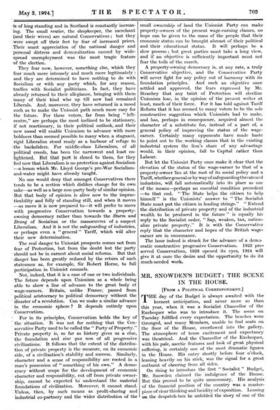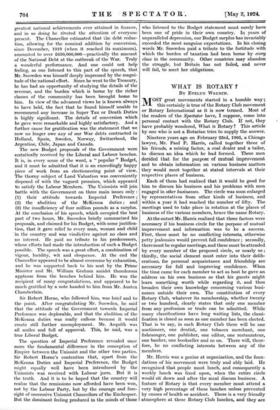MR. SNOWDEN'S BUDGET: THE SCENE IN THE HOUSE.
FROM A POLITICAL CORRESPONDENT.]
THE day of the Budget is always awaited with the keenest anticipation, and never more so than this year, when it was a Socialist Chancellor of the Exchequer who was to introduce it. The scene on Tueiday fulfilled every expectation. The benches were thronged, and many Members, unable to find seats on the floor of the House, overflowed into the gallery. The atmosphere of tense excitement and expectancy was theatrical. And the Chancellor of the Exchequer, with his pale, ascetic features and look of great physical suffering, is certainly one of the most dramatic figures in the House. His entry shortly before four o'clock, leaning heavily on his stick, was the signal for a great outburst of cheering from all sides. On rising to introduce the first " Socialist " Budget, Mr. Snowden claimed the indulgence of the House. But this proved to be quite unnecessary. His analysis of the -financial position of the country was a master- piece of clear thinking and lucidity of exposition. Leaning on the despatch-box he unfolded-the story of one of the greatest national achievements ever attained in finance, and in so doing he riveted the attention of everyone present. The Chancellor estimated that the debt reduc- tion, allowing for the nominal addition by conversion, since December, 1919 (when it reached its maximum), amounted to over £650,000,000—practically the amount of the National Debt at the outbreak of the War. Truly a wonderful performance. And one could not help feeling, as one listened to this part of the speech, that Mr. Snowden was himself deeply impressed by the magni- tude of the national effort. Since he went to the Treasury, he has had an opportunity of studying the details of the revenue, and the burden which is borne by the richer classes of the community has been brought home to him. In view of the advanced views he is known always to have held, the fact that he found himself unable to recommend any increase in Super Tax or Death Duties is highly significant. The details of conversion which he gave were remarkable and highly satisfactory. And a further cause for gratification was the statement that we now no longer owe any of our War debts contracted in Holland, Spain, Sweden, Norway, Switzerland, the Argentine, Chile, Japan and Canada.
The new Budget proposals of the Government were -ecstatically received by the Liberal and Labour benches. It is, in every sense of the word, a " popular " Budget, and it must be admitted that it is an exceedingly happy piece of work from an electioneering point of view. The thorny subject of Land Valuation was conveniently disposed of with the vaguest promises, which appeared to satisfy the Labour Members. The Unionists will join battle with the Government on three main issues only : (1) their attitude towards Imperial Preference ; (2) the abolition of the McKenna duties ; and (8) the insufficiency of four million pounds as a surplus. At the conclusion of his speech, which occupied the best part of two hours, Mr. Snowden briefly summarized his proposals, and claimed for his Budget, with some justifica- tion, that it gave relief to every man, woman and child in the country and was vindictive against no class and no interest. He paid no tribute to his predecessors, 'whose efforts had made the introduction of such a Budget possible. The speech was a great effort, a combination of vigour, lucidity, wit and eloquence. At the end the Chancellor appeared to be almost overcome by exhaustion, and he was supported back to his-seat by the Prime Minister and Mr. William Graham amidst thunderous applause from the benches behind him. He was the recipient of many congratulations, and appeared to be much gratified by a note handed -to him from Mr. Austen Chamberlain.
Sir Robert Home, who followed him, was brief and to the point. After congratulating Mr. Snowden, he said that the attitude of the Government towards Imperial Preference was deplorable, and that the abolition of the McKenna duties was really callous because it would create still further unemployment. Mr. Asquith was all smiles and full of approval. This, he said, was a true Liberal Budget.
The question of Imperial Preference revealed once more the fundamental difference in the conception of Empire between the Unionist and the other two parties. Sir Robert Home's contention that, apart from the McKenna Duties and Imperial Preference, the Budget might equally well have been introduced by the Unionists was received with Labour jeers. But it is the truth. And it is to be hoped that the country will realize that the remissions now afforded have been won, not by the Labour Party, but by the courage and fore- sight of successive Unionist Chancellors of the Exchequer. But the dominant feeling produced in the minds of those who listened to the Budget statement must surely have been one of pride in their own country. In years of unparalleled depression, our Budget surplus has invariably exceeded the most sanguine expectations. In his closing words Mr. Snowden paid a tribute to the fortitude with which the burden of taxation had been borne by every class in the community. Other countries may abandon the struggle, but Britain has not failed, and never will fail, to meet her obligations.















































 Previous page
Previous page